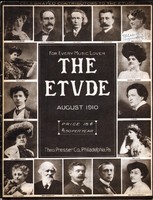By MARY M. SCHMITZ
Mankind is so constituted that he requires a reward of some kind for every effort made. Even great virtuosi, such as Paderewski, Busoni and de Pachmann, who have made music an end in itself, are not averse to receiving applause and praise from their audiences, nor are they any less pleased when this appreciation takes a financial form. Indeed, most of us are willing, with old Omar Khayyam, to "take the cash and let the credit go."
There is always a reward for piano students in the consciousness of good work accomplished, to say nothing of the pleasure gained from the increased insight into music as progress opens up new vistas before the traveler on music's thorny but fascinating path. Nevertheless, rewards of this kind can only appeal to the music lover whose passion for music is enough to make the weary grind of practice seem as nothing beside the pleasure gained out of the end accomplished. What can we teachers of children and young people offer as inducements to good, thorough work in piano study? The American child is bright, eager to learn, and willing to study, but he is restless, nervous, and pampered withal, and accustomed to being petted. Parents like Beethoven's father, who made his son rise at five in the morning to finish practice neglected the day before, are hardly to be found in America. School work takes up the greater part of the child's time, and, in the city at least, social diversions are many, and consequently music practice is liable to be shelved, unless some means is devised for making it as attractive as possible.
A PRACTICAL SYSTEM.
A plan such as the following often brings good results. A yellow star of the kind used in kindergarten work is awarded for a lesson perfectly played, the star being pasted on to the music used at the lesson. For a lesson not quite so perfect a red star may be given, two red stars being equal to one yellow one. At the end of a season, at the last recital in June, those who have fifty yellow stars, or their equivalent in red ones, are awarded a prize. Gold class pins, busts of musicians, etc., make suitable prizes. Those who have twenty-five yellow stars, or their equivalent in red ones, should receive prizes of lesser value than the first prizes, such as framed pictures of musicians, etc.
Sometimes a neglected etude or scale is given new life by the promise of a yellow star at the end of a lesson if the exercise or piece is brought up to the required point of perfection. The anticipation of gaining a yellow star will bring results that the promise of the ultimate good to be gained by the performance of a perfect lesson will not get. Children must have their reward in the present, and they want something they can see and touch. They are not old enough to realize the benefit of something the reward for which lies in a vague and distant future.
In the case of older pupils, the "star" system is open to objections on the score of "childishness," and other means have to be adopted. A suitable plan would be to award a prize to those who will learn and memorize during the winter season six pieces of music, all of which are to be perfect at the time of the June recital, and one or two of them to be on the program. It might be as well to insist that any one of the six pieces should be available for concert performance. The stimulus of prizes to be won, and the presence of parents, lends increased value to the honor of the award, and also serves to bring the parents in closer touch with the aims of the teacher.
A reward to each, one who will do the required work is a decided advantage over a reward won in open competition with other pupils, where many enter, but only one succeeds in getting a prize. In the latter case jealousy and heartache are inevitable, not only among the pupils, but among doting parents, who all believe that their own children are the ones most deserving.
I am disposed to regard with thankfulness, and even respect, the habits which have remained with me during life of always working resignedly at the thing under my hand till I could do it, and looking exclusively at the thing before my eyes till I could see it.—Ruskin.



